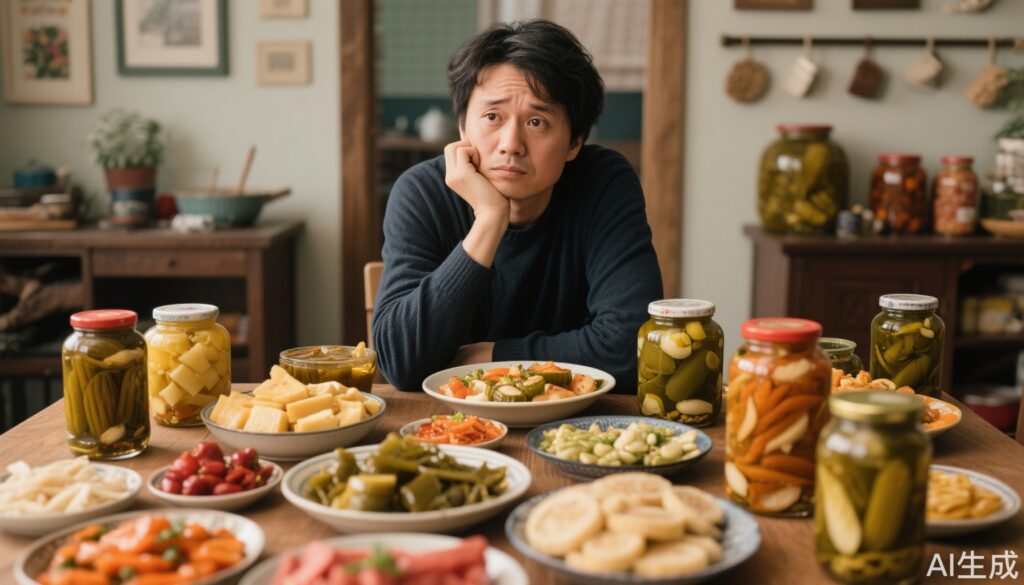Introduction
Pickled foods have been a staple in many cuisines, beloved for their unique flavors and their ability to enhance a meal. From sour pickled cucumbers to spicy kimchi, these fermented delights are enjoyed worldwide. However, recent research suggests that these culinary treats might come with significant health risks, particularly when consumed excessively.
Scientific and Clinical Evidence
In April 2023, a comprehensive study conducted by Zhejiang University School of Medicine was published in the journal BMC Medicine. The study analyzed health data from 440,000 individuals across 10 regions in China over nearly a decade. Participants ranged from 30 to 79 years old and had no chronic illnesses at the study’s onset. The findings highlighted a stark correlation between the frequent consumption of pickled foods and an increased risk of digestive cancers, particularly esophageal cancer, as well as hemorrhagic strokes.
What the Data Tell Us
The study revealed that individuals consuming pickled foods four or more times a week had a 13% higher risk of dying from digestive cancers and a 45% higher risk of esophageal cancer. Furthermore, these individuals also showed a 32% increased risk of dying from hemorrhagic strokes. Complementary findings published in the Asia-Pacific Journal of Cancer Prevention in 2014 further cemented the link between high salt intake from pickled foods and an increased risk of stomach cancer.
Why Pickled Foods Pose Risks
The primary concerns with pickled foods are their high salt content and the presence of nitrites. Excessive salt can damage the mucosal lining of the stomach and esophagus, leading to an increased cancer risk. Nitrites, often used in the pickling process, can react with proteins in the stomach to form nitrosamines, compounds known for their carcinogenic properties.
Why Are Pickled Foods So Addictive?
Despite their potential risks, pickled foods are incredibly popular due to their intense flavors. The fermentation process involves microbial activity that produces lactic acid, alcohol, and acetic acid, contributing to the distinct tangy taste. Additionally, the breakdown of proteins into amino acids like alanine and glutamic acid enhances the umami flavor, making these foods irresistible.
Correct Health Practices
While the risks are concerning, there are measures one can take to enjoy pickled foods more safely:
1. **Reduce Salt Intake:** Balance your diet by reducing salt in other meals if you’re consuming pickled foods.
2. **Ensure Proper Fermentation:** Allow enough time for the pickling process to complete to minimize the presence of harmful nitrites.
3. **Pair with Fresh Vegetables:** Consuming pickled foods with fresh vegetables rich in Vitamin C can help neutralize nitrosamines.
4. **Moderation is Key:** Limit the quantity consumed at one time to reduce health risks.
5. **Be Aware of Personal Health:** Individuals with high blood pressure, diabetes, or kidney issues should particularly limit intake.
Expert Recommendations
Health experts emphasize the importance of moderation and dietary balance. Registered nutritionist Xue Qingxin suggests integrating more fresh produce and maintaining a diverse diet to mitigate the potential harms of pickled foods.
Patient Scenario
Consider John, a 45-year-old man who loves pickled cucumbers and often eats them with meals. After learning about the associated health risks, John decides to reduce his pickled food intake to twice a week, ensuring he pairs them with fresh greens. He also cuts down on salt in other parts of his diet.
Conclusion
While pickled foods add flavor and variety to our meals, it’s crucial to consume them with caution. Understanding the associated health risks and adopting safer consumption practices can help mitigate potential dangers. As with many aspects of diet, balance and moderation are key.
References
1. Zhang, X., et al. (2023). “Consumption of Pickled Vegetables and Risk of Esophageal and Stomach Cancer: A Large Prospective Cohort Study.” BMC Medicine.
2. Asia-Pacific Journal of Cancer Prevention (2014). “Case-Control Study on Pickled Food and Stomach Cancer Risk.”



